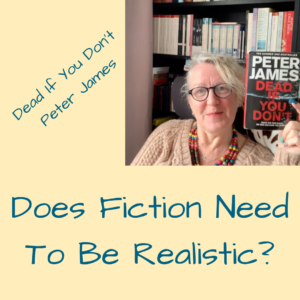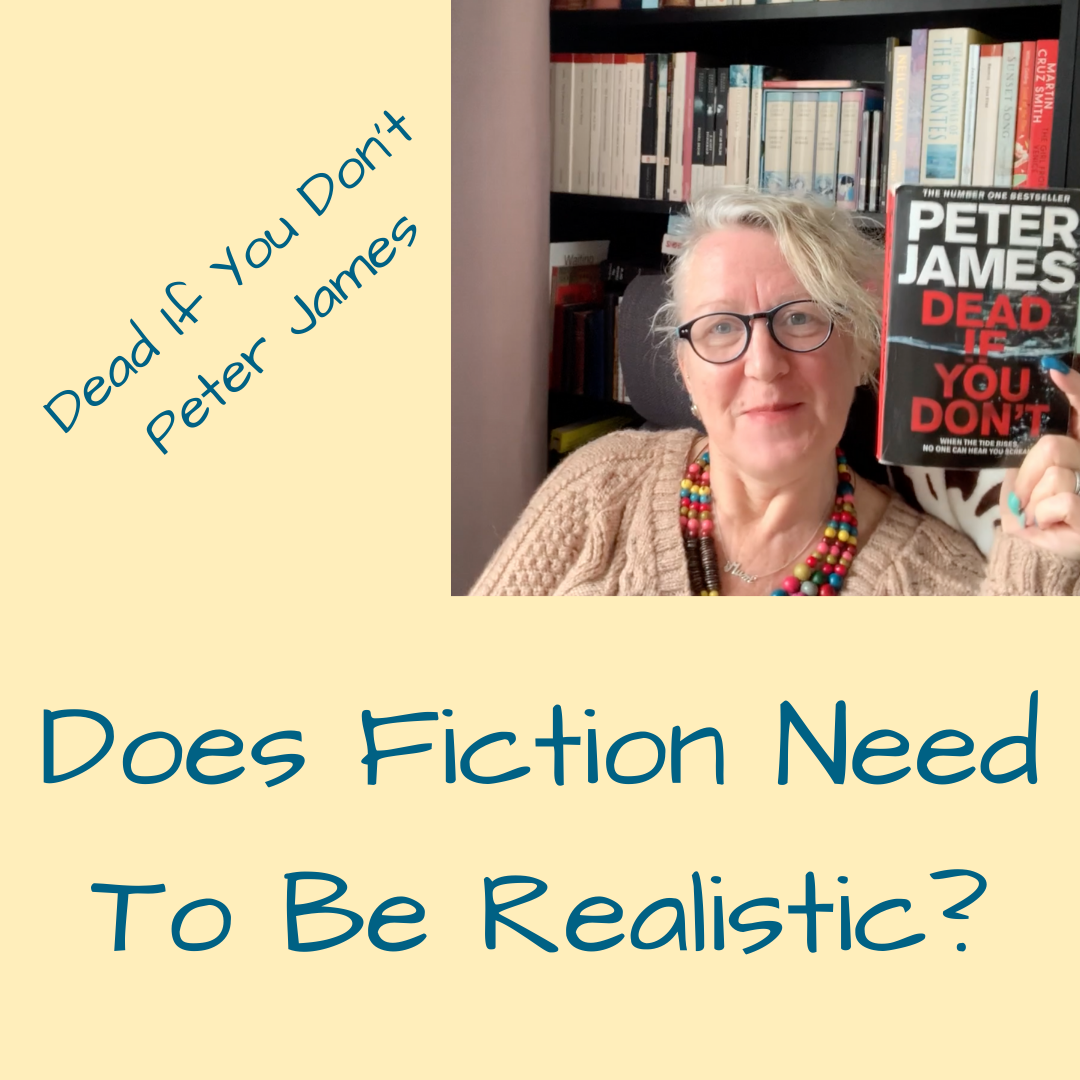Dead if you Don’t, Peter James – Book Review and Writer Tips

Watch the You Tube video HERE!
Prefer to read it instead, view the transcription below:
“Here’s another book review with a little bit of writing advice thrown in.
As you know I got addicted to this guy’s books, brilliant marketing, they standout on the book shelf.
I’ve actually picked this up in a charity shop and I knew exactly who it was, so bear that in mind, actually one of the first lessons of marketing. Make yourself visible on the shelf.
It’s in the series of Detective Superintendent Roy Grace series, if you like police procedurals you’ll like this.
This one is quite a thick book and a page turner.
One of his tricks, as you know, is short chapters, which I love.
A good hook at the end of each one aswell, something that you can use for your own writing, jumping between the characters for each chapter.
I think that’s a fairly basic piece of advice really. And before I forget, one of the things that I heard in a podcast not long back, and it’s something I’ve not really thought about and it was a marketing guru from Hollywood.
Movies have to have a promoting sentence, just one sentence, so it’s even shorter than an elevator pitch.
I’m sure that most of you know what an elevator pitch is by now, but just in case you don’t, you’ve got the blurb, which is quite sort of a long description of what’s in the book, you know, an explanation of what to expect and a bit of a story to it.
Mentioning the characters, and what genre it is, a lot of that is in the cover as well, the colour of the cover and differing fonts. But the blurb is longer.
[bctt tweet=”Your elevator pitch is something shorter, the expression comes from being in a lift in the UK or elevator in the US and if you’d only got 15 seconds in an elevator with somebody, how would you describe it?” username=”https://twitter.com/ChristieAdams23″]
So that’s your elevator pitch and it’s quite hard to get down to an elevator pitch.
But in movies, and I’ve not even thought about it until he said, but they do have just one sentence that sums up the film.
And what I’ve noticed with Peter James, I’ll have to look at my other books as to whether he’s always done this or whether it’s a recent thing, but he puts just one sentence on the front of the book. And on this one is ‘when the tide rises, no one can hear you scream’ this ties back to the plot. There’s also a water line obviously on the book cover, so it ties in with that too.
It’s a really clever marketing tip and that you can use on your own books.
So I’d love to know if you’ve noticed this with other writers.
Has it influenced your decision?
[Just a little tip from me via Peter and the guy on the podcast, and I can’t remember who he was, but it was a guru in marketing for movies.]
So back to this book, it’s quite funny because it’s set in Brighton in the UK, which is not a very high crime zone as far as I’m aware. This book goes completely over the top with the number of serious crimes in it. They even mention in the story just how many crimes are happening and for goodness sake, all in one week!
What they don’t put in this book, and this is where fiction beats fact, is all the media cover there would be if this many murders happened in Brighton.
These days the media globally, just sort of descend on communities and social media goes mad. And that’s the one thing that is missed out of this, which is artistic license. It’s mentioned briefly about the media, but it would be an absolute frenzy.
Because you’re writing a police procedural, it doesn’t mean that it has to be 100% accurate. You’re allowed to have that creative license and sort of miss out bits as it’s fiction. Whatever story you’re writing you might get criticised or told it isn’t realistic.
It’s not real life.
If you’re writing fiction, it’s a story.
It’s for escapism, it’s for people to enjoy.
It’s for people to get to know your characters.
It’s for you to have as a creative outlet, but it’s for people to enjoy and get what they like out of it.
When people read a police procedural, they know that in real life you wouldn’t go into a crime scene with your suit and tie on, and sort of walk all the way through the crime scene. You’re going to have the CSIs going in, but it’s fiction, so it doesn’t really matter if you miss that out.
Also people wear masks, right, a CSI who goes into a crime scene, they’ll have a mask on, but in a film you wouldn’t recognise the actor so that isn’t going to happen in every television show because you wouldn’t recognise who anybody is.
You wouldn’t know the main characters, so it’s allowed. It’s okay. People know that it’s fiction and it’s pretend and yes, they like the element of realism, but they also like to know that the baddies get their comeuppance at the end, which also is often fiction.
So allow yourself to write fiction.
This guy writes brilliant fiction. One of the things in it is the main character, it’s a ploy that again, you can use in your own writing. The main character in this book, apart from the policeman / protagonist, is not a nice bloke. So are you really willing him to win or not? You need that balance so you’ve got to give your character something ‘nice’. And in this case he’s got a child.
I won’t spoil it.
I don’t do spoilers.
If it’s in the blurb and it’s not, I won’t mention one of the other things, but you have to give your character, something that the audience or the reader will like about them, even if they’re a really horrible person.
Like Dexter on the TV, he was a mass murderer, but he was a nice guy, doing it for the right reasons. It’s fiction at the end of the day, but you really just have got to enjoy it.
And I really like this bloke. I think he’s a brilliant writer. It’s quite a thick book, picked up from a charity store, really good page turner, short chapters, pushing the realms of possibilities for a police procedural but still good, and it ties up at the end.
You’ve still got a few threads that can jump through to the next book in the series, which is always good for the series lovers amongst us.
I’ve not read these in any sort of order at all and they’ve still stood alone as good stories.
I’d like your opinion on this writer, I’ve mentioned him before.
I’m going on to some deeper reading after this one because I just needed this, with all the events going on at the moment in the globe and the pandemic I needed something to escape into.
What do you learn from writing?
Whether you want to write a police procedural and what tips and tricks you’ve got if you do?
Read a lot of books and join me on Goodreads because the more book recommendations I get the better.”
End of Transcription
Want to watch the video?
If you enjoyed this post, CLICK HERE and I’ll then make sure you receive my newsletter, so you’ll not miss out on future giveaways or blog content. You’ll get a FREEBIE too as a thank you.
Did you know I run The Independent Freedom Creative FREE Facebook Group?
It’s packed full with creatives who write or work at home or independently (or want to!)
Kindness is a key element. It’s all FREE and not spammy.
There are weekly threads where you can ask questions, self promote and join in on global networking.
You may also like:
My Latest Book Review & Writer Tips – You Are Dead, Peter James
My Tools Of The Trade (Stuff I use and like!)
(A few of the services I use to bring this free content to you. I earn a small commission on some – it doesn’t affect your price, in fact it could save you money- others I just love anyway so wanted to share with you. You’re supporting my work, enabling me to continue writing and keep this website and content free to you, thank you!)
I hope I’ve inspired you, tweet me from your next coffee stop!




